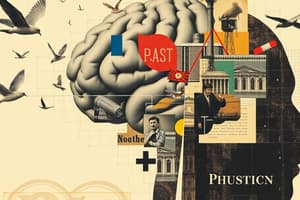Podcast
Questions and Answers
What does formal education typically result in at the end of a learning process?
What does formal education typically result in at the end of a learning process?
- Practical skills applicable to daily life
- An accredited certificate or degree (correct)
- Increased personal experience
- A lifelong love for learning
Which of the following best defines informal education?
Which of the following best defines informal education?
- Training that results in formal certification
- Courses taken outside of school leading to official diplomas
- Learning through structured school environments
- Education acquired through self-initiative and life experiences (correct)
Which element is NOT a major part of teacher-centered education?
Which element is NOT a major part of teacher-centered education?
- Child
- Curriculum
- Teacher
- Peer Influence (correct)
What does non-formal education emphasize?
What does non-formal education emphasize?
In a teacher-centered education model, what role does the teacher play?
In a teacher-centered education model, what role does the teacher play?
Which of the following is NOT a characteristic of formal education?
Which of the following is NOT a characteristic of formal education?
Which statement best describes the relationship between education and civilization?
Which statement best describes the relationship between education and civilization?
What is one example of non-formal education?
What is one example of non-formal education?
What is one of the primary goals of education according to the provided content?
What is one of the primary goals of education according to the provided content?
Which dimension of life is NOT mentioned as part of the harmonious development in true education?
Which dimension of life is NOT mentioned as part of the harmonious development in true education?
How does education relate to philosophy according to the content?
How does education relate to philosophy according to the content?
What does 'wholeness' in education refer to?
What does 'wholeness' in education refer to?
What form of education is described as having a formative effect on the mind and character?
What form of education is described as having a formative effect on the mind and character?
Which of the following best describes education's role in society?
Which of the following best describes education's role in society?
What type of education is focused on the learner's experiences and life situations?
What type of education is focused on the learner's experiences and life situations?
Which of the following illustrates a quality that is essential for teachers?
Which of the following illustrates a quality that is essential for teachers?
Which Latin term derived from the etymology of education means 'to bring out'?
Which Latin term derived from the etymology of education means 'to bring out'?
What is the primary purpose of education as inferred from the definitions provided?
What is the primary purpose of education as inferred from the definitions provided?
Which Sanskrit word, commonly used in India, is derived from a root that means 'to instruct'?
Which Sanskrit word, commonly used in India, is derived from a root that means 'to instruct'?
What analogy is used to describe a teacher without knowledge of aim according to B.D. Bhatia?
What analogy is used to describe a teacher without knowledge of aim according to B.D. Bhatia?
Which term describes a purposive education according to the content?
Which term describes a purposive education according to the content?
How was the term education perceived in the 1500s?
How was the term education perceived in the 1500s?
Which Greek word is sometimes associated with the concept of education?
Which Greek word is sometimes associated with the concept of education?
What is considered a key characteristic of purposive education?
What is considered a key characteristic of purposive education?
What is one responsibility of teachers regarding colleague relationships?
What is one responsibility of teachers regarding colleague relationships?
Which statement best describes the nature of education as a lifelong process?
Which statement best describes the nature of education as a lifelong process?
What role does education play in modifying behavior?
What role does education play in modifying behavior?
What is the primary purpose of education, according to the content?
What is the primary purpose of education, according to the content?
In what way is education considered systematic?
In what way is education considered systematic?
Which of the following aspects reflects the meaning of education being purposive?
Which of the following aspects reflects the meaning of education being purposive?
How does education contribute to societal development?
How does education contribute to societal development?
Which statement accurately reflects the relationship between education and life?
Which statement accurately reflects the relationship between education and life?
What is the primary focus of the Behaviouristic approach to learning?
What is the primary focus of the Behaviouristic approach to learning?
How does Mastery Learning enhance the learning process?
How does Mastery Learning enhance the learning process?
According to Constructivists, what role does an effective teacher play in the classroom?
According to Constructivists, what role does an effective teacher play in the classroom?
What does the humanistic approach to education emphasize?
What does the humanistic approach to education emphasize?
What is indicated about the status of teachers in a society?
What is indicated about the status of teachers in a society?
What aspect of teaching does professional ethics encompass?
What aspect of teaching does professional ethics encompass?
How should governments and communities support teachers?
How should governments and communities support teachers?
What differentiates teaching as a science from teaching as an art?
What differentiates teaching as a science from teaching as an art?
Flashcards are hidden until you start studying
Study Notes
Meaning and Concept of Education
- Education is a systematic process where individuals acquire knowledge, experience, skills, and positive attitudes.
- Education aims to create civilized, refined, cultured, and educated individuals.
- Education is essential for a civilized and socialized society.
- Education is considered a solution to various life problems.
- Education is the process of "waking up to life" - understanding its mysteries, challenges, and solutions.
- Education promotes the harmonious development of all human potential.
- True education fosters the balanced growth of physical, mental, moral (spiritual), and social aspects of life.
- The meaning of education is closely connected to human life and is influenced by philosophical fields like political, social, and economic philosophy.
General Aims of Education
- Every educational endeavor should have a clear objective.
- Aimless education is meaningless and leads to discouragement for both teachers and students.
- Purposive education brings life to the learning process.
- Purposive education creates awareness, foresight, and enthusiasm among teachers and students.
Formal, Informal, and Non-formal Education
- Formal education is structured learning overseen by government bodies, often leading to certificates or degrees.
- Informal education stems from experiences and self-directed learning outside formal settings.
- Non-formal education is independent learning acquired through non-academic means, like self-study or experience.
Teacher-Centered and Life-Centered Education
- Teacher-centered education revolves around the teacher as the central figure.
- Life-centered education emphasizes the holistic development of individuals, considering their experiences and interests.
- Mastery Learning emphasizes structured learning in small, sequential steps for better comprehension.
- Behavioristic approach focuses on reinforcement of positive behaviors through stimuli and reactions.
- Teaching can be viewed as both science and art, depending on the educational philosophy.
Professional Ethics of Teachers
- The teacher's role reflects the socio-cultural values of society.
- Teachers should be empowered to innovate and adapt their methods to meet the needs of their students and communities.
- Teachers should adhere to a professional code of ethics to ensure their dignity and integrity.
- Teachers are responsible members of society, playing a crucial role in shaping future generations.
- Teaching is a profession that underpins other professions.
Nature of Education
- Education is a continuous, lifelong process beginning from birth and continuing until death.
- Education involves the development of individuals from infancy to maturity.
- Education encompasses all influences on human personality.
- Education is a systematic process conducted within structured institutions and regulations.
- Education contributes to both individual and societal development.
- Education modifies and improves human behavior.
- Education is a purposeful endeavor, aiming to achieve specific goals.
- Education involves training and shaping individuals' senses, minds, behaviors, and skills.
- Education provides instruction and direction to fulfill desires and needs, promoting personal growth.
- Education is an essential element of a meaningful life.
Studying That Suits You
Use AI to generate personalized quizzes and flashcards to suit your learning preferences.




